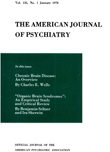Outcome of irregularly discharged psychiatric patients
Abstract
Clinicians' attitudes about the posthospitalization outcome of patients who are irregularly discharged from the hospital (i.e., against medical advice or AWOL) have been pessimistic, but unsystematic follow-up data of such patients compared with regularly discharged patients suggest that outcomes for the two groups are similar. Because of this discrepancy, the authors used data from a controlled, systematic study of a large sample of voluntary inpatients that measured global outcome over 2 years. Their findings suggest that 1 year and 2 years after admission, most patients who were irregularly discharged had outcomes similar to those of patients with regular discharges. There was, however, a subgroup of irregularly discharged patients who had worse outcomes.
Access content
To read the fulltext, please use one of the options below to sign in or purchase access.- Personal login
- Institutional Login
- Sign in via OpenAthens
- Register for access
-
Please login/register if you wish to pair your device and check access availability.
Not a subscriber?
PsychiatryOnline subscription options offer access to the DSM-5 library, books, journals, CME, and patient resources. This all-in-one virtual library provides psychiatrists and mental health professionals with key resources for diagnosis, treatment, research, and professional development.
Need more help? PsychiatryOnline Customer Service may be reached by emailing [email protected] or by calling 800-368-5777 (in the U.S.) or 703-907-7322 (outside the U.S.).



